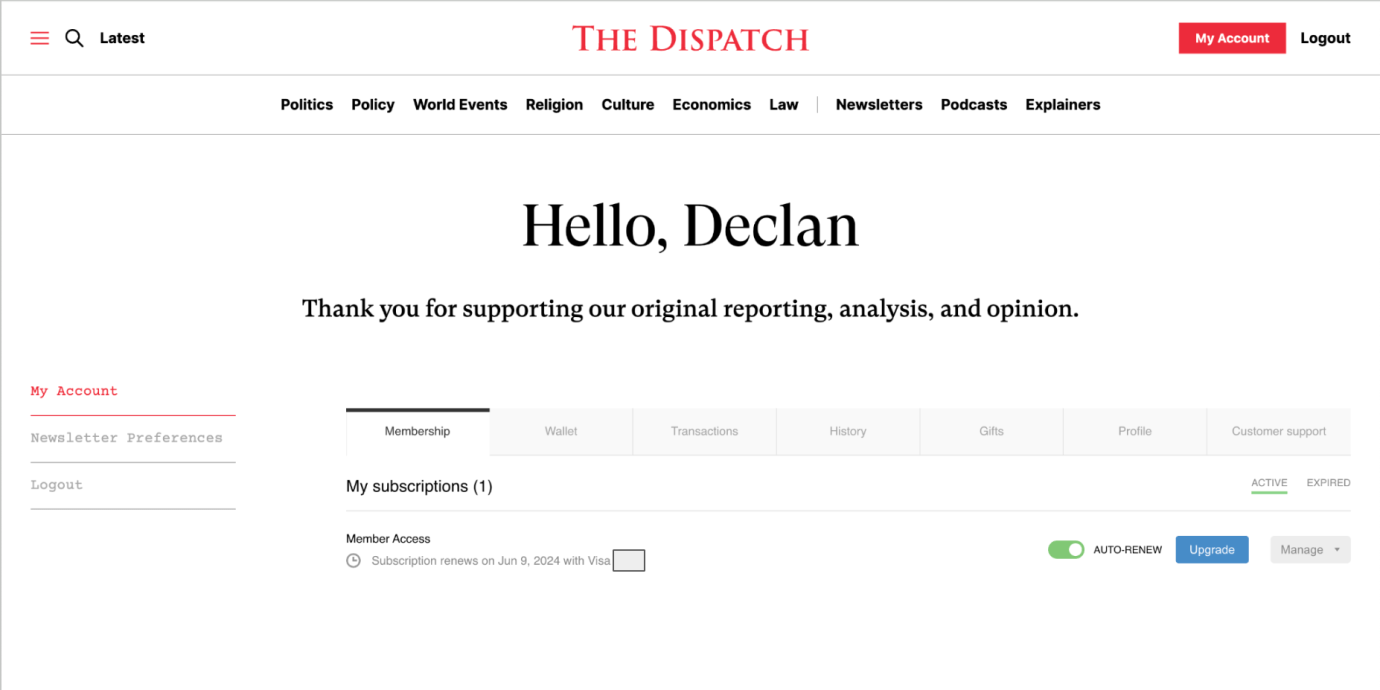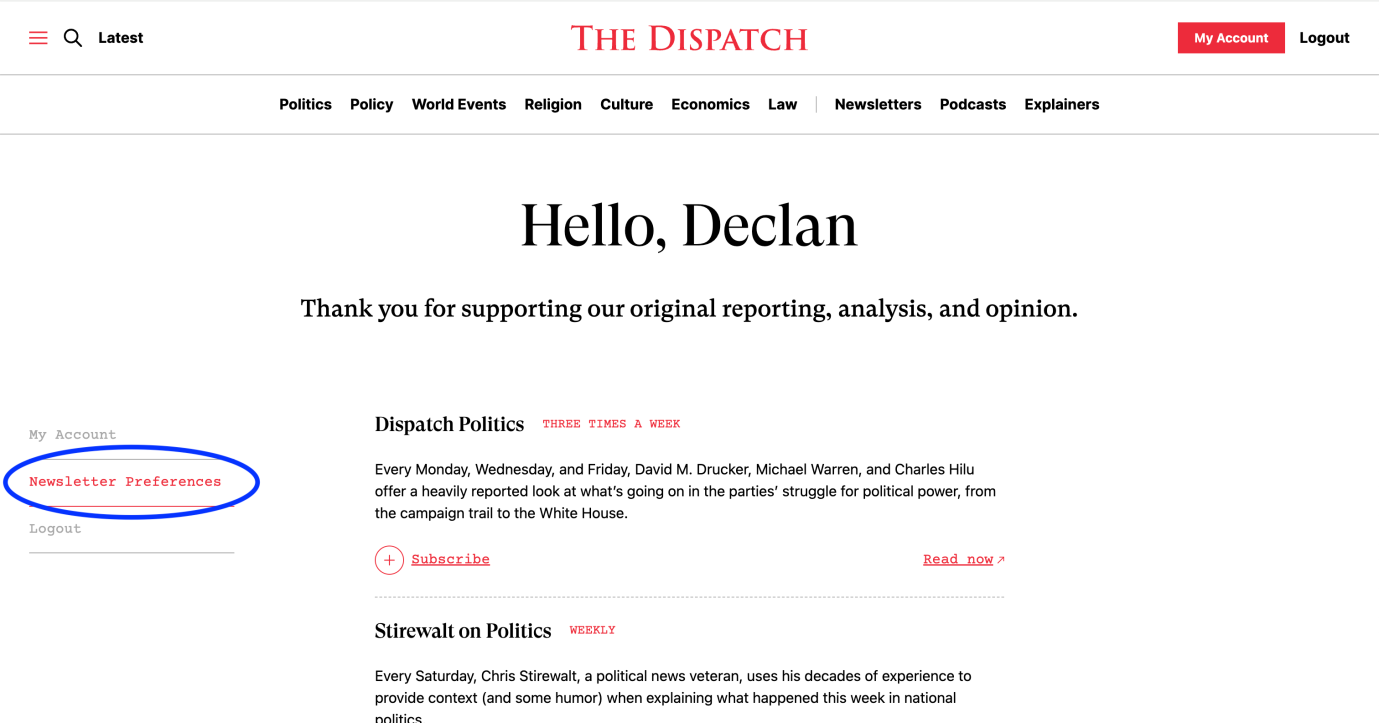Happy Monday! We’re personally devastated that the gathering of more than 700 people named Kyle in the city of Kyle, Texas, did not secure the world record. In fact, it wasn’t even particularly close: The 2,325 Ivans who got together in Kupres, Bosnia, in 2017 can sleep easy tonight.
Quick Hits: Today’s Top Stories
- Iranian President Ebrahim Raisi and Foreign Minister Hossein Amir Abdollahian, along with seven others, died in a helicopter crash on Sunday that occurred in a remote mountainous part of northwestern Iran as the leaders were returning from neighboring Azerbaijan. Searchers located the crash site on Monday morning local time, finding no survivors. Raisi, who was hand-selected by Iran’s supreme leader to serve as president in 2021, had been considered by many analysts to be the 85-year-old Ali Khamenei’s presumptive successor. As president, Raisi oversaw the violent suppression of mass anti-government protests that broke out in response to 22-year-old Mahsa Amini’s death-in-custody following her arrest by Iranian religious police in 2022. Under his leadership, Iran also accelerated its illegal nuclear program and continued to arm a network of allied terrorist groups, including Hamas and Lebanese Hezbollah.
- The Russian military gained ground over the weekend in its offensive in northeastern Ukraine, inching closer to Kharkiv City—the second largest city in Ukraine. The advances came near towns and cities like Lyptsi and Volchanks, which are close to Ukraine’s border with Russia. U.S. military officials have assessed that Russia hasn’t mobilized enough troops to fully break Ukraine’s lines or take Kharkiv City, and that the goal of the offensive is to push Ukrainian forces further from the border to create a buffer zone for Russian border towns and cities, namely Belgorod, that have come under attack throughout the war. But Dmitry Medvedev, the deputy chairman of Russia’s Security Council, said Friday that a buffer zone would need to encompass nearly all of Ukraine. The Ukrainian military, meanwhile, has reportedly asked the Biden administration to provide intelligence on Russian troop targets inside Russia, and Ukraine launched a series of drone and missile strikes on Russian oil and electrical infrastructure in southwestern Russia and Crimea on Friday.
- Benny Gantz, a member of Israel’s war cabinet and leader of the National Unity party, threatened to leave the government on Saturday if Prime Minister Benjamin Netanyahu doesn’t release a plan for ending the war in Gaza and securing the territory postwar. “Personal and political considerations have infiltrated the holy of holies of Israeli security,” Gantz said. “If you choose to lead the nation to the abyss, we will withdraw from the government, turn to the people, and form a government that can bring about a real victory.” Meanwhile, the Israel Defense Forces (IDF) announced Friday that it had recovered the bodies of three hostages—all of whom were killed on October 7 and taken into Gaza, according to the IDF.
- Tunisian authorities announced Saturday that 23 migrants in a boat bound for Europe are missing in the Mediterranean Sea more than two weeks after their departure from the North African country. The Tunisian coast guard said search and rescue operations remain ongoing. Some 3,000 people died crossing the central Mediterranean last year, according to the International Organization for Migration.
- The Iranian-backed Houthis in Yemen attacked an oil tanker in the Red Sea with a ballistic missile on Saturday, according to U.S. Central Command. The ship, a Panama-flagged and Greek-owned vessel that had departed from Russia, suffered flooding and briefly lost power and steering but was able to continue its journey to China. No injuries were reported.
‘There Are Far Better Things Ahead Than Any We Leave Behind’
If you’re reading this, that means our website migration went through four or five hours ago as planned—and that the .000000000048 percent chance of said migration opening a wormhole that swallowed up existence as we know it didn’t come to pass. Phew.
We wrote to you on Friday about the rationale for the upgrades, but now that we’re all officially here together, we’d like to give you a more formal tour of our new home.
Homepage

Our new homepage allows us to feature more of the work that we’re doing, and makes it easier for you to access all of that work.
Main Menu

The new menu serves as a one-stop shop, taking you just about anywhere on the website in two clicks or less. And yes, those are some new logos you’re seeing.
Authors Module

Quickly access the latest work from your favorite Dispatch writers and personalities.
In Short

A section featuring highlights of The Dispatch’s video journalism, from hard-hitting interviews with newsmakers to engaging Dispatch Live snippets to hilarious behind-the-scenes outtakes.
How to Access These New Features
Want to just log back into your account and never consciously think about these changes again? Luckily for you, our intrepid web developers have been working behind the scenes on this for months—and have already done about 98 percent of the work for you. Here’s all you need to do:
Navigate to www.thedispatch.com and click the Login button in the top-right corner.

When prompted, enter the email address associated with your Dispatch account and click next.

You will receive an email from members@thedispatch.com that looks like this. Click the blue hyperlink inside that email, or copy and paste the enclosed URL directly into your browser. You will be redirected to our website and logged into your account.

Once there, click the My Account button in the top-right corner.

That button will take you to your membership portal, where you can confirm you have the correct membership (monthly, annual, lifetime) in the Membership tab, have a valid payment option on file in the Wallet tab, and change your display name (for the comments section) in the Profile tab. If you have any questions about what you see here, click the green Get Help button in the Customer Support tab, or send us an email at members@thedispatch.com.

Once that’s all squared away, head to the Newsletter Preferences page and ensure that the boxes next to all of the newsletters that you’d like to receive are checked.

FAQs
Do I need a password?
You don’t! This website is entirely passwordless, meaning all you need to log in to your account is your email address—and access to that email account.
What’s up with the new look of the comments section?
We’re glad you noticed! We’ve partnered with a platform called Disqus to upgrade the features available to commenters, including the ability to like articles and comments, collapse comment threads, post (clickable) hyperlinks, customize your notification preferences, mute or block commenters you’d rather not interact with, and a whole lot more.
The one feature that didn’t make it over in the web migration is commenter avatars. We’re working to restore the ability to upload a profile picture for the comment section, and will let you know when that functionality is back. In the meantime, you can update your commenting display name in the Profile tab of the membership portal, as outlined above.
What should I do if any of the steps above aren’t working for me for whatever reason?
Email us! We have a team on standby at members@thedispatch.com ready and eager to assist you.
(You can also email us even if all the steps above are working, just to tell us how great the new site is 😀)
Worth Your Time
- Writing for Works in Progress, Samuel Hughes explored theories as to why so many buildings today are relatively drab and simple. “For the first time in history, many high-status buildings have little or no ornament,” Hughes wrote. “Although a trained eye will recognize more ornamental features in modern architecture than lay people do, as a broad generalization it is obviously true that we ornament major buildings far less than most architectural cultures did historically.” Hughes outlined the “naive” demand theory for this shift—that people in charge began desiring different kinds of buildings—and what he considers the “sophisticated” supply theory: that modern labor costs increased the price of ornamental buildings. “I like the supply-side theory, and I think it is elegant and clever,” Hughes wrote. “But my argument here will be that it is largely wrong. It is just not true that twentieth-century technology made ornament more expensive: in fact, new methods of production made many kinds of ornament much cheaper than they had ever been. … Something like the naive demand-side theory has been true all along: to exaggerate a little, it really did happen that every government and every corporation on Earth was persuaded by the wild architectural theory of a Swiss clockmaker and a clique of German socialists, so that they started wanting something different from what they had wanted in all previous ages. It may well be said that this is mysterious. But the mystery is real.”
- Slovakian Prime Minister Robert Fico is no longer in imminent danger of losing his life after undergoing multiple surgeries following an assassination attempt last week. But his country is on edge. “Slovakian politics are deeply polarized in ways that have tipped into rhetorical and even physical violence,” Alena Krempaska wrote for the New York Times. “Journalists and activists, particularly women, have received online threats. But in large part, the hateful rhetoric—of which there is lots—is confined to the internet, and it has become normalized. Lawmakers, activists and journalists take it to be the price of participating in civic life. We reassure ourselves that those who write threatening messages online are not usually the ones who carry them out. … But someone has now shot the prime minister. In retrospect, it seems that the hateful rhetoric was gradually, inevitably building to violence, and we are waiting in this dangerous moment to see what comes next. Either the attack will trigger harsh action from the government and make everything worse. Or cooler heads will prevail, and we will pause, pick up the pieces of our fractured country and try to put them back together.”
Presented Without Comment
NBC News: Rudy Giuliani Is Served Indictment Papers at His Own Birthday Party After Mocking Arizona Attorney General
In a now-deleted post on X, Giuliani taunted Arizona authorities. “If Arizona authorities can’t find me by tomorrow morning; 1. They must dismiss the indictment; 2. They must concede they can’t count votes,” Giuliani posted Friday night. Accompanying the message was a photo of Giuliani smiling with six others and balloons arranged behind them.
An hour and 14 minutes later, [Arizona’s Democratic Attorney General Kris] Mayes responded to Giuliani’s post, writing, “The final defendant was served moments ago. @RudyGiuliani, nobody is above the law.”
Also Presented Without Comment
The Hill: Member of Taiwan’s Parliament Steals Bill To Prevent Its Passage
Also Presented Without Comment
Reuters: Pope Francis Says U.S. Catholic Conservatives Have ‘Suicidal Attitude’
In the Zeitgeist
We hope we don’t curse her by including her in this section, but Caitlin Clark played in New York on Saturday for the first time as a member of the Indiana Fever. The Fever didn’t take home the win, but Clark put on a show in front of a sold-out crowd at the Barclays Center that set a new record in WNBA ticket sales.
Toeing the Company Line
- In the newsletters: The Dispatch Politics crew reported on the scandal disrupting a congressional race in Oregon, Nick weighed in on (🔒) the Justice Alito upside-down flag story, and Chris dove into (🔒) the debate about the debate about the debates.
- On the podcasts: Jonah ruminated on the man vs. bear thought experiment, how to approach voting, and the problems of algorithmic pricing. On today’s episode of The Dispatch Podcast, Jamie is joined by George Packer to discuss leftist culture in universities and how it’s changed since the George Floyd protests of 2020.
- On the site over the weekend: Anthony Barr reviewed the new Flannery O’Connor film, Wildcat, Christopher Scalia revisited the discography of The Smiths, and Hannah Anderson explored what is missed in the “tradwife” debate.
- On the site today: Brian Riedl defends defense spending even as the national debt skyrockets while Charlotte reports from Kibbutz Eilon in Israel on the looming northern front.
Let Us Know
So … what do you think of our new digs?







Please note that we at The Dispatch hold ourselves, our work, and our commenters to a higher standard than other places on the internet. We welcome comments that foster genuine debate or discussion—including comments critical of us or our work—but responses that include ad hominem attacks on fellow Dispatch members or are intended to stoke fear and anger may be moderated.
With your membership, you only have the ability to comment on The Morning Dispatch articles. Consider upgrading to join the conversation everywhere.